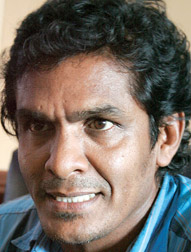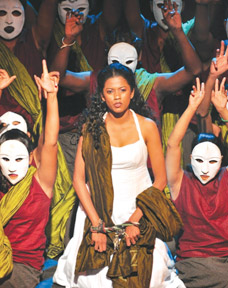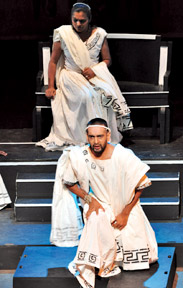|

Live on, Classics !
Sachitra MAHENDRA
Credited for introducing Sophocles to the local theatre, Priyankara
Rathnayaka recently took a different route directing Aristophanes'
Lysistrata. "So many ask me why I dwell on tragedies. May be because I
have directed two tragedies. That is one reason why I wanted
Aristophanes' comedy on our local stage," comments our 'Encounter of the
Week'.
Rathnayaka teaches theatre at Kelaniya University, the only place
which offers it as a separate subject, and leads 'Academic Players'
which had won several awards over the years.
Q: Only a few years have lapsed since theatre was introduced
as a separate subject in the university. Other visual arts such as
cinema and teledrama have not been elevated to that status.
|
Rathnayaka
in a nutshell
Oedipus
Translation of Sophocles'
'Oedipus the King'
(tr: Siri Ediriweera)
Visekariyo
Translation of Aristophanes' 'Lysistrata'
(tr: Aruna Premarathne)
Ada Vage Davasaka Antigone
Translation of Sophocles' 'Antigone'
(tr: Ariyawansa Ranaweera) |
 |
|
Priyankara
Rathnayaka.
Picture by Dushmantha Mayadunne |
A: Theatre was already being taught, but as a part of a
subject. It was a part of Sinhala Literature and Fine Arts. It became a
separate subject based on a few reasons. First it was becoming popular.
Second, it was not so complicated as cinema. It did not require
complicated technological equipment. Cinema and teledrama require more
complicated resources. We do not have sufficient funds to maintain it as
a separate subject area.
Even in stage plays we have one major obstacle. We do not have a
proper theatre hall to practise theatre studies. But that has not barred
us from doing research on theatre. At the university we mostly make use
of a lecture hall or the convocation hall. Some universities make use of
their sports ground.
Q: They say actors are born, not made. Same goes for writers
and other artistes. If that is so, how do you think theatre could be
taught?
A: No, we cannot teach theatre. What we can do is to guide.
Our main problem is that we do not teach the segments of theatre. We
teach the whole subject. For instance theatre consists several segments
such as scriptwriting, directing, costume design, make up design, stage
lighting and acting. These segments must be taught separately. Some
students may be skilled in scriptwriting. Some may be in directing. At
our university we have visiting lecturers to teach these separate
segments. But everyone must play in at least one production.
Q: Kelaniya University was instrumental in producing a harvest
of stage plays. 'Academic Players' is one major party.
A: In any university specific subjects have associations. Mass
Communication students have a Mass Communication circle. Christian
Students have a Christian Association. Likewise Academic Players is an
association formed by both general and special undergraduates as well as
graduates of the subject.
On the positive side, the past students, who are now working
elsewhere as senior artistes, also support this association. This
exposes the undergraduates to a wide area. They will get an opportunity
to take part in main cultural events as they pass out of the university.
Academic Players are mostly occupied in organising drama festivals as
well as gathering funds. When you study a different subject area, these
are considered extra activities. But in theatre, it is not. It is linked
into the subject.
So unlike other universities, we have the festivals of our own
productions in addition to one or two outsourced productions.
 |
|
Ada Vage
Davasaka Antigone |
Q: The stage play attraction, which dawned sometime back,
still continues. Most plays are light humour.
A: It is doubtful if most of those plays are actually
humorous. We all know the attention to the stage play came up following
the end of war. It was largely because the people were fed up with the
television.
So they needed a change. What is common was that they required some
light humour. Most of our dramatists took it wrong. It is a little
dangerous, because people will give up the stage play too some day in
future, when they get fed up.
Q: Your forte is 'classical' or 'good' plays. Where do you
draw the line between 'good' and 'bad'?
A: A good drama offers deep insights into life. It must
portray a facet of the society we live in today. Whether it is a
translation or original, it does not matter as long as the play offers
such insights. 'Antigone' is an ancient Greek play. But still it poses
the questions we already have today.
It deals with law, the power of law, the conflict between natural and
human law. Aren't we facing these issues even today? When the ancient
law was studied, it had been compulsory to study Roman drama.
As academics, our objective is to bring theatre to the common men's
circles. But it has to be classical and good, which gives insights.
Q: But unlike most light humour plays, 'Antigone' is complex
with rich expressions. Do you think the common man is capable of
grasping such contents?
A: The problem is who the common man is. I think the answer
lies in the audience. Unlike television, the stage play has a limited
crowd. That is mostly from urbanized areas.
They are somewhat exposed to entertainment as well as edutainment. A
very common man with very little knowledge would hardly buy a ticket and
step into theatre. Only the urbanized people have such privileges.
 |
|
Oedipus |
So I do not think this 'rich expressions' is such an issue. On the
other hand, most classical stage plays like Shakespeare's had been
watched by the common men when it first came up. For instance
Elizabethan plays were watched by the queen as well as the lowest
strata. The plays we consider serious had been quite popular in the
distant past.
Q: Your new addition is Lysistrata, which is a serious comedy.
How do you see the difference between serious and light comedy?
A: There is so much to laugh at when you watch a light comedy.
But you do not take anything outside the theatre hall. A serious comedy
would not let you go empty handed. It offers you something to think
about. Any deep profound comedy has a tragedy embedded, and any deep
profound tragedy has a comedy embedded.
Anton Chekhov named his 'Cherry Orchard' as a comedy, but
Stanislavski produced it as a tragedy. We watch Charlie Chaplin to
laugh, but in the end we realize his face had a painful expression. He
made comedies to express the struggles of his life.
Many serious comedies question the society. They question the
hypocrisy of various philosophers. At the same time they give you an
opportunity to think what kind of solutions will go for the deep issues
we face.
On the other hand, the ancient playwrights made use of comic
interludes to give some light entertainment to the viewer. In 'Hamlet'
there is a comic interlude before all the characters face a tragic
death. That is to make the viewer ready for the tragic event. Even our
dramatists of yore practised this.
|





